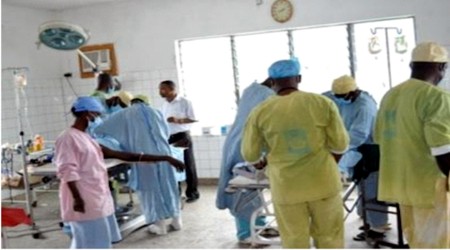The Director General of the Nigeria Centre for Disease Control (NCDC), Dr. Chikwe Ihekweazu, Monday, confirmed that the second case of COVID-19 in the country is a Nigerian in Ogun State.
He said the patient is a contact of the index case, a 44-year-old Italian man, and has been in isolation since the first case was confirmed. Ihekweazu however declined to give more information about the new patient.
The NCDC boss also disclosed that for the first time in Africa, researchers have successfully performed the genome sequencing of the coronavirus strain brought to Nigeria by the index case and matched it with the strain circulating in Italy and Wuhan.
“The result has been shared with international authorities and the Director General of the World Health Organisation (WHO) has extended congratulations to Nigerian scientists for this achievement,” Ihekweazu said, noting that the feat was coordinated by the Lagos State Ministry of Health and NCDC.
Contrary to media reports, Ihekweazu said he has completed the WHO recommended 14-day self-isolation or quarantine for people who visited high-risk areas. He had been part of the Dr. Bruce Aylward-led WHO-China expert group that visited Wuhan early February. “I have completed the 14-day recommended period and resumed work today (on Monday),” he stated.
On the second COVID-19 case in Nigeria, Ihekweazu told The Guardian: “The source of infection of this case is known and we are working to manage the risk of spread. The case does not have any symptoms currently but has been placed under care at the Infectious Disease Hospital in Lagos.”
He said the details of the case could not be made public because “the government of Nigeria and health workers always have an obligation to ensure patient confidentiality.”
Allaying fears, the NCDC boss said: “The Nigeria Centre for Disease Control has initiated stronger public health interventions. Since the beginning of the outbreak in China and subsequent spread to other countries, one of the important response strategies, at the containment stage, has been to identify all contacts, ensure their strict isolation and follow up daily with checks for any symptoms of the disease. The NCDC has been supporting both the Lagos and Ogun State Ministries of Health in implementing these response strategies.”
He added: “The testing of all contacts of the confirmed case is a new strategy to ensure that new cases are detected early. In addition, we will begin to test for cases through the routine national influenza sentinel surveillance network.
“We have also rapidly scaled up our risk communications efforts and urge Nigerians to only share information from verified authorities including the Federal Ministry of Health, NCDC or State Ministry of Health.”
During a media parley at the University of Benin Teaching Hospital (UBTH) in Edo State yesterday, Minister of Health, Dr. Osagie Ehanire, also confirmed that a Nigerian has contracted the virus, saying: “This brings the total number of confirmed COVID-19 cases in Nigeria to two.”
This came as President Muhammadu Buhari constituted a six-member committee to assess the impact of the pandemic on Nigeria’s economy.The panel, chaired by Minister of Finance, Budget and National Planning Zainab Ahmed, will review the effects of the global health challenge on crude oil prices.
Other members are: Minister of State for Petroleum Resources Timipre Sylva; Minister of State for Finance, Budget and National Planning, Clement Agba; Central Bank of Nigeria Governor Godwin Emefiele; and Group Managing Director of the Nigeria National Petroleum Corporation Mele Kyari.
The committee is expected to submit its report between Tuesday (today) and Wednesday.Following the inaugural closed-door meeting with Buhari at the President Villa, Ahmed told State House Correspondents that the 2020 national budget would be reviewed as crude oil prices were already sliding because of the outbreak.
“It is very clear that we will have to revisit the crude oil benchmark price of $57 per barrel. We have to revisit it and lower the price. Where it will be lowered to is the subject of the work of this committee.
“What the impact will be on that is that there will be reduced revenue to the budget and it will mean cutting the size of the budget. The quantum of the cut is what we are supposed to assess as a committee,” Ahmed said.
Fielding questions about whether Nigeria would discuss with Russia on increasing oil production and lowering prices, Sylva said: “We, as a member of OPEC, are not in a position to take that engagement on our own unilaterally. There was a disagreement between OPEC and OPEC+. It’s not just Russia. But the biggest producers within OPEC and OPEC+ are Saudi Arabia and Russia.
“We believe that in the coming days, when all of us would have begun to see effect of the reduction of prices, OPEC and OPEC+ might need to meet again and reconsider our positions. We expect also that a lot of discussions are going on at the level of Saudi Arabia and Russia. But as Nigeria, we are not in a position to begin to engage members on this matter.”
The Nnamdi Azikiwe University meanwhile has barred Chinese nationals who lecture at the institution from returning to work. The staff had travelled to China in December before the outbreak of the virus. The vice-chancellor, Prof. Charles Esimone, said the action was taken to protect the university community and the country. He explained that the institution has since introduced an online alternative.

